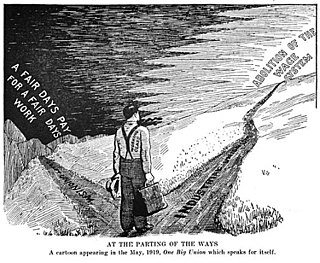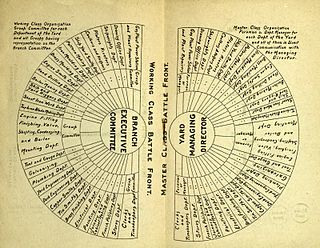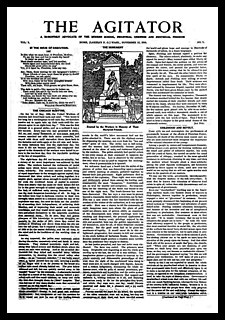Related Research Articles

Syndicalism is a current in the labor movement to establish local, worker-based organizations and advance the demands and rights of workers through strikes. Most active in the early 20th century, syndicalism was predominant amongst revolutionary left in the Interwar era which preceded the outbreak of World War II.

The Industrial Workers of the World (IWW), members of which are commonly termed "Wobblies", is an international labor union that was founded in Chicago in 1905. The origin of the nickname "Wobblies" is uncertain. IWW ideology combines general unionism with industrial unionism, as it is a general union, subdivided between the various industries which employ its members. The philosophy and tactics of the IWW are described as "revolutionary industrial unionism", with ties to socialist, syndicalist, and anarchist labor movements.
Anarcho-syndicalism is a political philosophy and anarchist school of thought that views revolutionary industrial unionism or syndicalism as a method for workers in capitalist society to gain control of an economy and thus control influence in broader society. The end goal of syndicalism is to abolish the wage system, regarding it as wage slavery. Anarcho-syndicalist theory generally focuses on the labour movement. Reflecting the anarchist philosophy from which it draws its primary inspiration, anarcho-syndicalism is centered on the idea that power corrupts and that any hierarchy that cannot be ethically justified must be dismantled.
The International Workers' Association – Asociación Internacional de los Trabajadores (IWA–AIT) is an international federation of anarcho-syndicalist labor unions and initiatives.

Thomas Mann, was an English trade unionist and is widely recognised as a leading, pioneering figure for the early labour movement in Britain. Largely self-educated, Mann became a successful organiser and a popular public speaker in the British labour movement.
Anarchism in South Africa dates to the 1880s, and played a major role in the labour and socialist movements from the turn of the twentieth century through to the 1920s. The early South African anarchist movement was strongly syndicalist. The ascendance of Marxism–Leninism following the Russian Revolution, along with state repression, resulted in most of the movement going over to the Comintern line, with the remainder consigned to irrelevance. There were slight traces of anarchist or revolutionary syndicalist influence in some of the independent left-wing groups which resisted the apartheid government from the 1970s onward, but anarchism and revolutionary syndicalism as a distinct movement only began re-emerging in South Africa in the early 1990s. It remains a minority current in South African politics.

The 1913 Paterson silk strike was a work stoppage involving silk mill workers in Paterson, New Jersey. The strike involved demands for establishment of an eight-hour day and improved working conditions. The strike began in February 1913, and ended five months later, on July 28. During the course of the strike, approximately 1,850 strikers were arrested, including Industrial Workers of the World (IWW) leaders Bill Haywood and Elizabeth Gurley Flynn.

Anarchism in Australia arrived within a few years of anarchism developing as a distinct tendency in the wake of the 1871 Paris Commune. Although a minor school of thought and politics, composed primarily of campaigners and intellectuals, Australian anarchism has formed a significant current throughout the history and literature of the colonies and nation. Anarchism's influence has been industrial and cultural, though its influence has waned from its high point in the early 20th century where anarchist techniques and ideas deeply influenced the official Australian union movement. In the mid 20th century anarchism's influence was primarily restricted to urban bohemian cultural movements. In the late 20th century and early 21st century Australian anarchism has been an element in Australia's social justice and protest movements.

The Industrial Workers of the World (IWW) is a union of wage workers which was formed in Chicago in 1905 by militant unionists and their supporters due to anger over the conservatism, philosophy, and craft-based structure of the American Federation of Labor (AFL). Throughout the early part of the 20th century, the philosophy and tactics of the IWW were frequently in direct conflict with those of the AFL concerning the best ways to organize workers, and how to best improve the society in which they toiled. The AFL had one guiding principle—"pure and simple trade unionism", often summarized with the slogan "a fair day's pay for a fair day's work." The IWW embraced two guiding principles, fighting like the AFL for better wages, hours, and conditions, but also promoting an eventual, permanent solution to the problems of strikes, injunctions, bull pens, and union scabbing.
The Industrial Syndicalist Education League (ISEL) was a British syndicalist organisation which existed from 1910 to 1913.

The First International Syndicalist Congress was a meeting of European and Latin American syndicalist organizations at Holborn Town Hall in London from September 27 to October 2, 1913. Upon a proposal by the Dutch National Labor Secretariat (NAS) and the British Industrial Syndicalist Education League (ISEL), most European syndicalist groups, both trade unions and advocacy groups, agreed to congregate at a meeting in London. The only exception was the biggest syndicalist organization worldwide, the French General Confederation of Labor (CGT). Nevertheless, the congress was held with organizations from twelve countries participating. It was marked by heated debate and constant disagreements over both tactics and principles. Yet, it succeeded in creating the International Syndicalist Information Bureau as a vehicle of exchange and solidarity between the various organizations and the Bulletin international du mouvement syndicaliste as a means of communication. It would be viewed as a success by almost all who participated.
The Industrial and Commercial Union (ICU) was a trade union and mass-based popular political movement in southern Africa. It was influenced by the syndicalist politics of the Industrial Workers of the World, as well as by Garveyism, Christianity, communism, and liberalism.

The Industrial Workers of Great Britain was a group which promoted industrial unionism in the early 20th century.
The Syndicalist League of North America was an organization led by William Z. Foster that aimed to "bore from within" the American Federation of Labor to win that trade union center over to the ideals of Revolutionary syndicalism.
The political philosophy of anarchism has had a small presence in New Zealand politics.
The International Socialist League of South Africa was the earliest major Marxist party in South Africa, and a predecessor of the South African Communist Party. The ISL was founded around the syndicalist politics of the Industrial Workers of the World and Daniel De Leon.

The Socialist Labour Party was a socialist political party in the United Kingdom. It was established in 1903 as a splinter from the Social Democratic Federation (SDF) by James Connolly, Neil Maclean and SDF members impressed with the politics of the American socialist Daniel De Leon, a Marxist theoretician and leading figure of the Socialist Labor Party of America. After decades of existence as a tiny organisation, the group was finally disbanded in 1980.
A. M. Stirton (1872–1939) was an American politician who participated in political activity as a member of the Socialist Party of America and the Industrial Workers of the World. Stirton eventually shifted his views away from electoral politics and advocated "direct action" in the industrial sector.

The Agitator was a radical newspaper published by Jay Fox of the anarchist Home Colony in the American state of Washington from 1910 to 1912.

The Industrial Workers of the World or IWW (SA) had a brief but notable history in the 1910s-20s, and is particularly noted for its influence on the syndicalist movement in southern Africa through its promotion of the IWW's principles of industrial unionism, solidarity, and direct action, as well as its role in the creation of organizations such as the Industrial Workers of Africa and the Industrial and Commercial Workers' Union.
References
- 1 2 Thomas, Matthew James. "Paths to Utopia: Anarchist Counter-Cultures in Late Victorian and Edwardian Britain 1880-1914". Warwick Research Archive Portal. University of Warwick. Retrieved 4 April 2016.